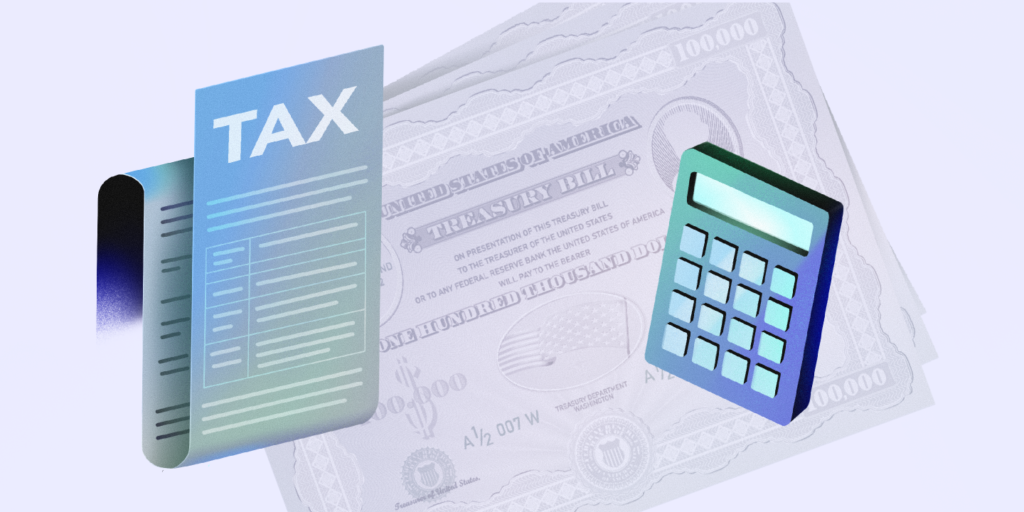If you’re considering investing in Treasury bills, a type of U.S. government bond, it’s important to understand the specific tax status that applies to these investments.
Investors who already own these securities should ensure that they pay the IRS what they owe, and should know what to expect in terms of taxation when their Treasury bills reach maturity.
Meanwhile, taxpayers who are thinking about buying Treasury bills should consider the potential impact of taxes on their decision. Some investors choose to buy these securities because of the tax advantages associated with them. These tax advantages may offset the often-moderate interest earnings from Treasury bills. You should consult your legal and/or tax advisors before making any financial decisions.
What Is A Treasury Bill?
A Treasury bill, or T-bill, is a short-term fixed-income security issued by the Department of the Treasury. You can buy T-bills directly from the government, but it may be easier to access them through Public. All you need is a Treasury Account and you’ll be able to start earning the rate of 26-week Treasury bills, which currently offer a 5.3% interest rate.*
T-bills are distinguished from similar government-issued securities because of their short-term nature: they have maturity dates starting 4 weeks to 1 year
Through issuing Treasury bills and similar Treasury securities, the United States government can obtain money to fund federal projects. Meanwhile, investors earn money on these investments via interest payments distributed after they reach maturity. These returns are reliable, if modest. This makes Treasury bills a good option for investors who want a short-term and secure way to safeguard their wealth.
Are T-Bills Taxed?
As with other government securities, investment income on Treasury bills is taxed federally by the Internal Revenue Service. Income earned from Treasury bills is not subject to state tax, and is not subject to local income taxes. Treasury bill income is, in other words, partially but not entirely tax-exempt.
When you buy a Treasury bill, it is sold at a discounted price from its face value, or par value. After the Treasury bill matures, which takes no longer than a year, the investor is paid back the full value of the security. The difference between the full face value and the discounted value is the investor’s taxable interest. Treasury bill rates vary depending on economic conditions, so your potential profit can also vary depending on when you buy. This taxable income is, once again, only subject to federal income tax.
In addition to taxable interest, if an investor sells a Treasury bill on the secondary market at a profit, that profit may be subject to capital gains tax. This often happens when T-bills are purchased at a discount larger than the bill’s original discount at issuance.
How To Determine What Taxes You Owe on T-Bills
If you own Treasury bills in a given year, you’ll receive a 1099-INT in the first few months of the following year, generally from the firm where you custody your Treasury bills. Public users will receive a form if they’ve earned $10 or more in interest income during the given year. You can find more info about how to access your tax forms here.
The form 1099-INT will explain how much interest you have earned on any government securities you hold, including Treasury bills. This applies to Treasury bills that have reached maturity within the recent tax year.
Once you know what your taxable interest earnings are, you can calculate the taxes you owe on these earnings. You should always consult a tax professional before making any decisions regarding taxes.
Since Public uses a broker to trade T-bills, you’ll also likely receive a 1099-B that shows the trades performed in your account and your gains and losses.
How to Pay Taxes on Treasury Bills
When an investor earns interest income from Treasury bills, they should list this income on their tax return form.
The income that they list on these tax forms is then federally taxed at the investor’s own marginal tax rate, according to the tax bracket and taxpayer status they fall into. It should not taxed on the state or local level, though you should always consult with a tax professional to discuss your specific situation.
Investors also have the option of automatic withholding, if they so choose. In this case, a percentage of interest income is withheld and transferred to the IRS automatically. If the Treasury bills are purchased through TreasuryDirect, you can select automatic withholding to reduce the effort of calculating and paying taxes, but taxpayers who choose this option cede some control over the process and may still owe taxes based on their unique circumstances.
Tax Advantages and Disadvantages of Treasury Bills
Though income earned from Treasury bills is taxed at a federal level, the lack of taxation from state and local governments can be an advantage for taxpayers. This is especially true if investors live in areas with high income municipal or state taxes.
While Treasury bills do not tend to come with especially large returns, the minimized taxes paid on these modest earnings can make Treasury bills a more profitable option relative to similar low-risk investments.
For instance, depending where you live, Treasury bills may result in greater net, after-tax earnings compared to high-yield savings accounts, Certificates of Deposit, and corporate bonds, simply because Treasury bills are not taxed on the state and local level.
Conclusion
The interest income earned on Treasury bills is taxable at the federal level, and earnings from Treasury bills sold on the secondary market can be taxed via capital gains taxes.
Nevertheless, because the interest earnings from Treasury bills are not taxed at state or local levels, these investments may be especially advantageous for those who live in a high-tax state such as New York or California.
The tax advantages of Treasury bills helps make them a reliable and low-risk option for investors. As always, you should consult your legal and/or tax advisors before making any financial decisions.

